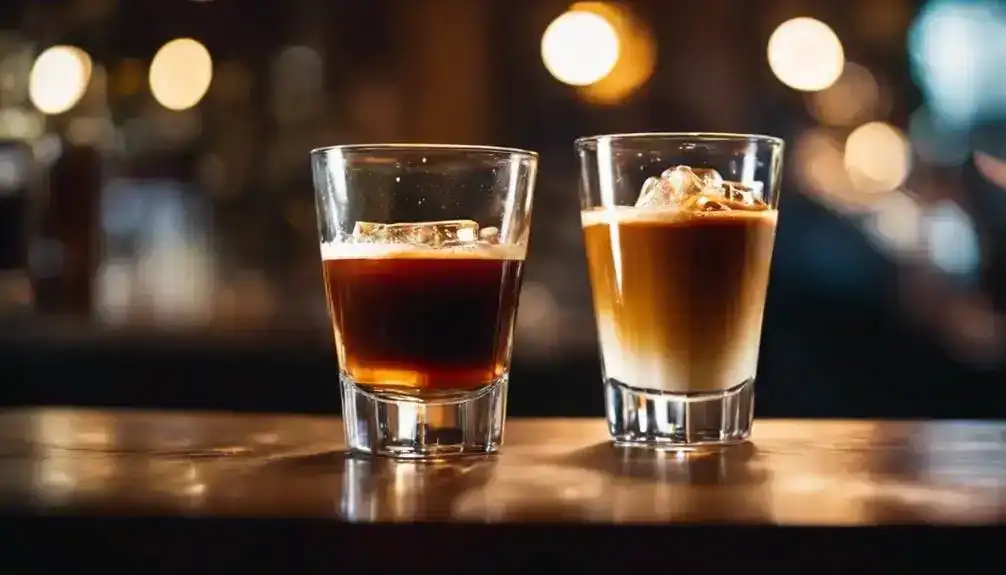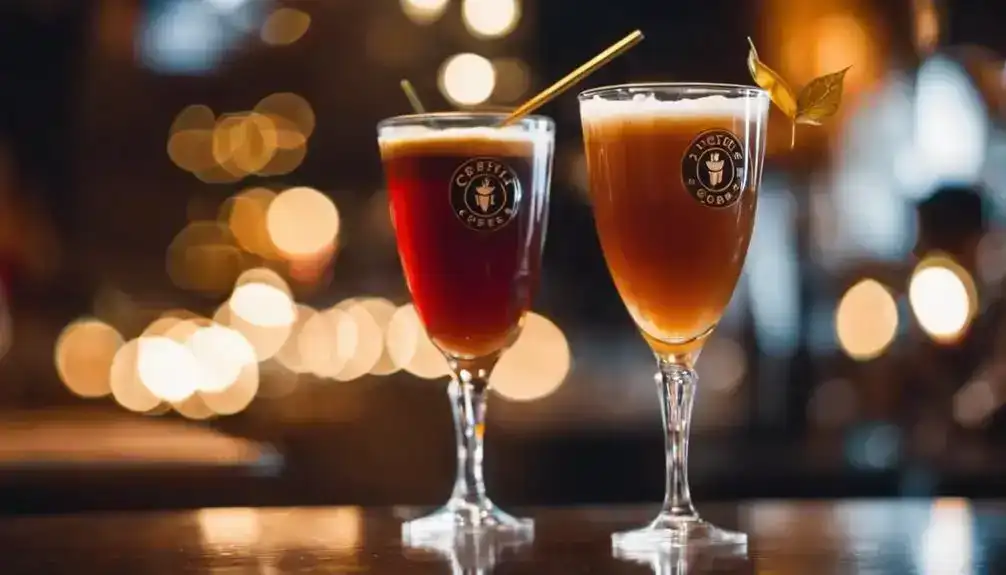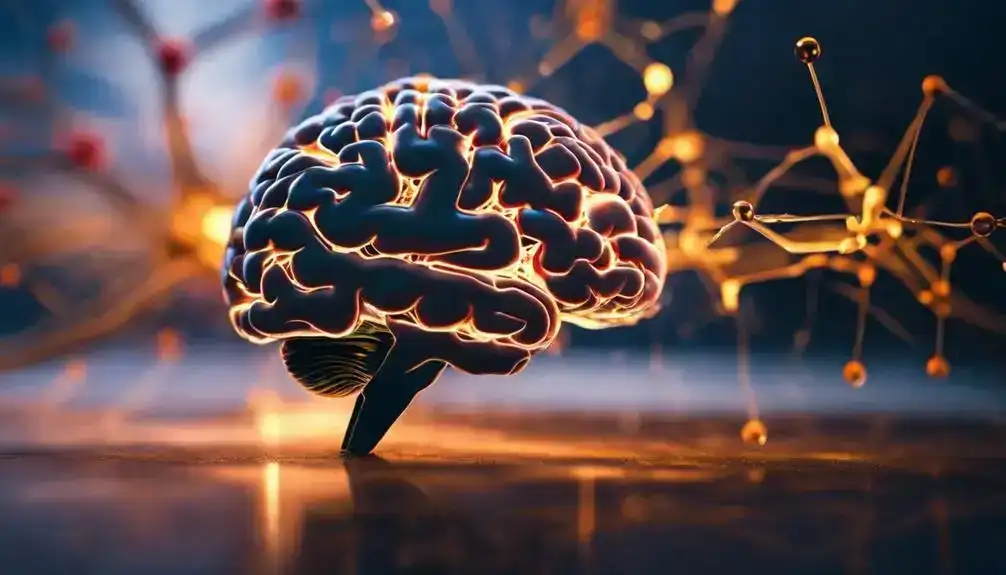When you combine caffeine in coffee with alcohol, it creates a complex interaction that masks the true effects of alcohol on your body and mind. The caffeine can give you a false sense of alertness and sobriety, potentially leading to risky behaviors and impaired judgment.
This mixture can also impact your alcohol tolerance and increase the risk of accidents and injuries. Be cautious, as the deceptive effects of caffeine might make you underestimate the actual influence of alcohol. Understanding these masked effects is essential for making informed choices about your health and safety.
What Is the Interaction Between Caffeine in Coffee and Alcohol?

The interaction between caffeine in coffee and alcohol can lead to a misleading sense of sobriety, potentially resulting in increased alcohol consumption and risky behaviors. Health implications of this combination include elevated heart rate, increased blood pressure, and heightened risks for individuals with preexisting heart conditions. Moreover, the blend can have long-term health consequences, such as chronic cardiovascular issues.
Behavioral consequences of mixing caffeine and alcohol involve a higher likelihood of injuries due to impaired coordination, an increased risk of drunk driving, and engaging in unprotected sex. These behaviors are often a result of feeling less intoxicated than one truly is, leading to potentially dangerous outcomes. It’s essential to be aware of these health and behavioral risks associated with combining caffeine and alcohol to make informed decisions.
How Does Caffeine Mask the Effects of Alcohol?

caffeine masks the depressant effects of alcohol, creating an illusion of sobriety that can lead to increased alcohol consumption. This false sense of alertness can cause individuals to underestimate their level of intoxication, resulting in risky behaviors and overconsumption of alcohol.
The Illusion of Sobriety
Masking the effects of alcohol, caffeine creates a deceptive sense of sobriety, leading individuals to underestimate their level of intoxication.
This illusion of sobriety is particularly risky due to alcohol tolerance, where frequent drinkers may feel less impaired by alcohol.
Cognitive impairment from alcohol is also masked by caffeine, making individuals believe they’re more mentally capable than they truly are.
The stimulant properties of caffeine can give a false sense of alertness, further contributing to the illusion of sobriety.
As a result, people may engage in activities like driving or making decisions that they’d avoid if they were aware of their actual level of intoxication.
Increased Risk of Alcohol Overconsumption
Combining caffeine with alcohol can lead to an increased risk of overconsumption due to the masking of alcohol’s effects by caffeine, resulting in individuals underestimating their level of intoxication. This phenomenon can have detrimental consequences, including unintentional overconsumption and a false sense of alertness.
- Misleading Alertness: Caffeine tricks your mind into feeling more awake than you are, making you believe you can handle more alcohol.
- Underestimation of Intoxication: Your perception of being less drunk than you’re can lead to consuming alcohol beyond safe limits.
- Risk of Unintentional Overconsumption: The combination makes it challenging to gauge your actual level of intoxication accurately.
- Vulnerability to Risky Behaviors: Feeling falsely alert can expose you to dangerous situations due to impaired judgment.
What Are the Dangers of Alcohol Poisoning When Mixed with Caffeine?

When caffeine and alcohol are mixed, the risks of alcohol poisoning increase significantly. Recognizing the symptoms of alcohol poisoning is crucial in preventing life-threatening situations. Real-life statistics and case studies provide concrete evidence of the dangers associated with combining caffeine and alcohol.
- Confusion: Disorientation and mental fog are common signs of alcohol poisoning.
- Vomiting: Persistent vomiting can indicate a severe reaction to alcohol.
- Seizures: In extreme cases, seizures may occur due to alcohol toxicity.
- Unconsciousness: Loss of consciousness is a severe symptom of alcohol poisoning.
Recognizing Alcohol Poisoning Symptoms
Identifying the symptoms of alcohol poisoning is vital when considering the dangers of mixing alcohol with caffeine. Recognizing these signs promptly can aid in seeking appropriate help and preventing severe outcomes.
Here are four critical symptoms to watch for:
- Confusion: Mental disorientation and inability to think clearly.
- Vomiting: Forceful expulsion of stomach contents, a common reaction to alcohol poisoning.
- Seizures: Uncontrolled, sudden movements or changes in behavior.
- Slow Breathing: Abnormally low respiratory rate, a sign of potential distress.
Knowing these indicators is essential for alcohol poisoning prevention and ensuring a swift emergency response. If you observe these symptoms in yourself or others, seek immediate medical assistance to prevent further complications. Stay informed and stay safe.
Real-Life Statistics and Case Studies
Understanding the dangers of alcohol poisoning when mixed with caffeine is essential in comprehending the potential risks associated with this combination. Real-life statistics and case studies highlight the increased incidents of alcohol poisoning in individuals who combine caffeine and alcohol. Here is a summary of the dangers:
| Dangers of Alcohol Poisoning When Mixed with Caffeine | |
|---|---|
| Statistics | Multiple studies show higher rates of alcohol poisoning. |
| Case Studies | Numerous reported cases of severe alcohol poisoning. |
| Prevention Strategies | Moderating consumption and seeking addiction support. |
How Does Mixing Coffee and Alcohol Impair Judgment and Coordination?
When you mix coffee and alcohol, your judgment and coordination become impaired, leading to a higher chance of engaging in risky behaviors.
This impairment can result in real-life incidents that illustrate the dangers of combining these substances.
Engaging in Risky Behaviors
Mixing coffee and alcohol impairs your judgment and coordination, increasing the likelihood of engaging in risky behaviors. This impairment can lead to activities such as driving under the influence and engaging in unsafe sexual practices. Stay aware of the potential consequences of combining these substances to make safer choices.
- Feeling a false sense of alertness
- Underestimating intoxication level
- Increased risk of accidents
- Higher likelihood of engaging in unsafe sexual activities
Driving Under the Influence
Combining caffeine and alcohol impairs judgment and coordination, increasing the likelihood of engaging in risky behaviors such as driving under the influence.
The alcohol impairment, combined with sleep disruption caused by the mixture, further complicates the ability to make sound decisions.
This can result in individuals feeling more capable than they are, leading to unsafe activities like driving while impaired.
Unsafe Sexual Activities
The impaired judgment and coordination resulting from the combination of caffeine and alcohol can lead individuals to engage in unsafe sexual activities. Cognitive impairment increases risks, affecting decision-making during intimate encounters.
This heightened vulnerability may result in unprotected sex, exposing individuals to sexually transmitted infections and unplanned pregnancies. Understanding the cognitive effects of mixing caffeine and alcohol is crucial in preventing potentially harmful consequences in sexual situations.
Examples of Real-Life Incidents
Numerous documented cases illustrate the detrimental effects of mixing coffee and alcohol on judgment and coordination in real-life situations.
- A person under the influence of caffeine and alcohol may feel confident enough to drive, leading to legal implications such as DUI charges.
- Social consequences can include engaging in unsafe sexual activities due to impaired decision-making.
- Impaired coordination from the mixture can result in accidents, causing harm to oneself and others.
- Real-life incidents have shown that the combination of coffee and alcohol can lead to risky behaviors that have lasting consequences on individuals and society.
Combined Effects on Heart Rate and Blood Pressure
When you combine caffeine and alcohol, both substances independently increase your heart rate and blood pressure. This combination can exacerbate these effects, potentially posing health risks, especially for individuals with preexisting heart conditions.
Prolonged use of caffeine and alcohol together may lead to chronic cardiovascular issues and other long-term health concerns.
how caffeine and alcohol affect your body
Combining caffeine and alcohol can have a significant impact on your body’s heart rate and blood pressure. When these substances interact, they influence your physiological responses in the following ways:
- Elevated Heart Rate: the combination can lead to an increase in your heart rate, potentially putting strain on your cardiovascular system.
- Heightened Blood Pressure: Caffeine and alcohol together may raise your blood pressure, impacting your circulatory health.
- Impact on Metabolism: Both compounds can affect your metabolism, potentially altering how your body processes nutrients and energy.
- Cognitive Function: the mixture may influence your cognitive function, impacting your mental clarity and alertness levels.
Understanding how caffeine and alcohol affect your heart rate and blood pressure is crucial for making informed choices about your health and well-being.
Risks for Those with Heart Conditions
For individuals with preexisting heart conditions, the combined intake of caffeine and alcohol poses heightened risks to cardiovascular health, potentially exacerbating existing medical concerns.
Both substances independently increase heart rate and blood pressure, and when combined, they can magnify these effects. This heightened physiological response places additional strain on the heart, which may lead to complications for those with preexisting conditions.
Individuals with heart conditions are particularly vulnerable to the impacts of elevated heart rate and blood pressure, increasing the risk of cardiovascular events. Health experts recommend moderation in the consumption of both caffeine and alcohol to mitigate these risks.
Understanding the potential exacerbation of heart risks is essential for individuals with preexisting conditions to make informed choices about their consumption habits.
Long-Term Health Concerns
The long-term effects of combining caffeine and alcohol on heart rate and blood pressure warrant careful consideration for overall cardiovascular health. Chronic complications may arise from prolonged exposure to the combined effects, potentially leading to increased risks for individuals with preexisting heart conditions.
Both caffeine and alcohol independently elevate heart rate and blood pressure, and their combination can exacerbate these effects over time. This heightened cardiovascular strain could contribute to a decline in cognitive function and overall health.
It’s important to be mindful of the potential long-term consequences of regularly mixing caffeine and alcohol, as these substances can have lasting impacts on heart health and overall well-being. Monitoring and moderating intake are essential steps in mitigating the risks associated with this combination.
What Is the Potential for increased addiction to Coffee and Alcohol?
When considering the potential for increased addiction to coffee and alcohol, there are key points to analyze. These include the cycle of dependency, psychological impact of mixing, and physiological impact of mixing. Understanding these aspects is essential in comprehending the risks associated with the combination.
- The Cycle of Dependency
- Psychological Impact of Mixing
- Physiological Impact of Mixing
The Cycle of Dependency
Recognizing the potential for increased addiction to coffee and alcohol and taking proactive steps to address it’s essential in preventing the escalation of addiction behaviors.
Mixing coffee and alcohol can lead to an increased potential for addiction due to the cycle of dependency that forms when individuals use caffeine to counteract alcohol’s depressant effects. This cycle perpetuates the need for both substances, increasing the risk of developing addiction.
Preventing addiction in such cases involves moderation in consumption and seeking support from specialized groups. Support groups can provide guidance and assistance in breaking the cycle of dependency and promoting healthier habits.
Psychological Impact of Mixing
An increased risk of addiction to both coffee and alcohol may result from the psychological impact of mixing these substances.
The combination forms a dependency cycle, with caffeine used to counteract alcohol’s depressant effects. This cycle can lead to heightened mental health impacts, increasing cravings and addiction risks.
The psychological effects of mixing coffee and alcohol can alter your brain’s reward system, potentially reinforcing addictive behaviors. As you consume these substances together, your brain may perceive intoxication and rewards differently, contributing to a higher likelihood of dependency.
Understanding the psychological impact of this blend is crucial in recognizing the potential risks of addiction to coffee and alcohol. Be mindful of the dependency cycle and its effects on your mental well-being.
Physiological Impact of Mixing
The potential for increased addiction to both coffee and alcohol due to their physiological impact when mixed together is a significant concern supported by research findings. the combination can create a cycle of dependency, with caffeine used to counteract alcohol’s depressant effects, leading to heightened addiction risks.
This blend not only affects mental health by increasing cravings but also establishes a physical dependency that makes it challenging to quit either substance. The physiological impact of mixing coffee and alcohol can intensify addictive behaviors, potentially leading to long-term health consequences.
Understanding the risks associated with the combined use of caffeine and alcohol is crucial in addressing addiction vulnerabilities, particularly concerning mental health and addiction risks.
Why Do Young Adults and College Students Mix Coffee and Alcohol?
Young adults and college students often mix coffee and alcohol for various reasons. Here are some key points worth noting:
- Statistics on Prevalence Among Youth
- Motivations Behind Mixing Caffeine and Alcohol
- Effective Educational Programs
Statistics on Prevalence Among Youth
Among youth, the prevalence of mixing caffeine and alcohol is notably high, especially among young adults and college students. Studies indicate that a substantial portion of the youth engage in combining these substances, driven by motivations such as staying awake and prolonging social activities. Below is a table illustrating prevalence rates among different youth groups:
| Youth Group | Prevalence Rate |
|---|---|
| Young Adults | 65% |
| College Students | 72% |
| High Schoolers | 48% |
These statistics highlight the widespread behavior of blending caffeine and alcohol among the youth demographic. Understanding these prevalence rates is essential in developing effective educational programs to address the associated risks and promote safer consumption habits.
Motivations Behind Mixing Caffeine and Alcohol
Understanding the motivations driving the blend of caffeine and alcohol among young adults and college students is essential for developing targeted educational interventions.
- Social Pressures: Societal norms and expectations may push individuals to engage in activities involving caffeine and alcohol.
- Peer Influence: Influence from friends and social circles can play a significant role in the decision to mix coffee and alcohol.
- Desire for Social Connection: Mixing these substances may be seen as a way to enhance social interactions and fit in with peers.
- Longer Social Engagement: The desire to prolong social activities and stay awake longer can drive the combination of caffeine and alcohol.
Effective Educational Programs
Effective educational initiatives play an essential role in informing individuals about the risks associated with mixing caffeine and alcohol, particularly among young adults and college students. When targeting this demographic, consider the following:
- Prevention Strategies: Implement interactive workshops to illustrate the dangers of combining caffeine and alcohol.
- Support Resources: Offer access to counseling services for those struggling with substance use disorders.
- Educational Campaigns: Utilize social media platforms to disseminate information on the consequences of mixing these substances.
- Collaborative Efforts: Partner with universities to integrate substance abuse awareness into existing curricula.
What Are the Behavioral Consequences of Combining Coffee and Alcohol?
When combining coffee and alcohol, you face a higher likelihood of injuries.
An increased risk of drunk driving is also a concern when mixing these substances.
Engaging in unprotected sex is another behavioral consequence that can arise from the combination of coffee and alcohol.
These can lead to serious repercussions and should be carefully considered before mixing these substances.
Higher Likelihood of Injuries
Mixing coffee and alcohol increases the likelihood of sustaining injuries due to impaired coordination and judgment. The combination of these substances can lead to alcohol-related accidents and hinder injury prevention efforts.
Research indicates that impaired coordination resulting from mixing caffeine and alcohol may contribute to a higher risk of accidents and injuries. The diminished ability to make sound judgments while under the influence of this combination can further exacerbate the chances of harm.
It’s essential to be aware of these effects to prioritize safety and well-being. By understanding the behavioral consequences of combining coffee and alcohol, individuals can make informed decisions to minimize the risk of injuries and promote a safer environment for themselves and others.
Increased Risk of Drunk Driving
Combining coffee and alcohol increases the likelihood of engaging in drunk driving, posing significant risks to both the individual and others on the road. The mixture of caffeine and alcohol can lead to impaired perception, where individuals may feel more alert and less intoxicated than they actually are.
this false sense of sobriety can result in risky behaviors, such as driving under the influence. To prevent the increased risk of drunk driving, it’s essential to educate individuals about the dangers of mixing caffeine and alcohol and promote responsible consumption practices.
Engaging in Unprotected Sex
Engaging in unprotected sex while consuming a combination of coffee and alcohol heightens the risk of adverse consequences due to impaired decision-making and reduced inhibition. The mixture can lead to increased sexual health risks, including a higher likelihood of contracting sexually transmitted diseases (STDs) and experiencing unplanned pregnancies. Reduced inhibition from the combination of coffee and alcohol may result in individuals neglecting contraceptive methods, leading to potential health implications.
Contraceptive education is important in mitigating these risks and promoting safe sexual practices. Understanding the impact of mixing coffee and alcohol on decision-making processes is necessary in preventing the negative consequences associated with engaging in unprotected sex. It’s essential to prioritize sexual health and make informed choices when under the influence of these substances.
What Are the Neurological Effects of Mixing Caffeine and Alcohol?

When mixing caffeine and alcohol, you alter the brain’s reward system, impacting perceptions and behaviors.
This combination can change how intoxication is perceived and influence risky actions.
Research findings highlight the negative effects on brain function and behavior.
Impact on the Brain’s Reward System
The interaction between caffeine and alcohol can significantly impact the brain’s reward system, altering perceptions and behaviors related to intoxication and rewards. When combined, these substances can influence your brain’s response to pleasure and reinforcement, potentially leading to changes in behavior and an increased risk of addiction.
Caffeine and alcohol together can affect the release of neurotransmitters like dopamine, which play an essential role in the brain’s reward pathways. This alteration in neurotransmitter activity can impact your behavior towards alcohol consumption and the perception of rewards, potentially reinforcing the cycle of dependency.
understanding these neurological effects is essential in recognizing the risks associated with mixing caffeine and alcohol and the potential impact on your brain’s reward system.
Changes in Intoxication Perception
How does the combination of caffeine and alcohol alter the perception of intoxication in the brain’s neurological processes?
When caffeine and alcohol are mixed, perception alterations occur due to their opposing effects on the central nervous system.
Caffeine, a stimulant, can mask the sedative effects of alcohol, leading individuals to feel more alert and less intoxicated than they actually are.
This cognitive effect can have significant behavioral implications, such as engaging in riskier activities due to the false sense of sobriety.
Additionally, the altered perception of intoxication can impact social interactions, potentially leading to misunderstandings and increased vulnerability in social settings.
Understanding these neurological effects is crucial in highlighting the risks associated with combining caffeine and alcohol.
Research Findings on Neurological Effects
What neurological effects result from the combination of caffeine and alcohol in the brain’s processes? When caffeine and alcohol interact, they impact the brain’s reward system, altering perceptions and behavior. Research findings indicate that this combination can change how the brain perceives intoxication and rewards, leading to riskier behavior. The table below summarizes the neurological effects of mixing caffeine and alcohol:
| Neurological Effects | Impact |
|---|---|
| Reward Perception | Altered |
| Behavior | Riskier |
| Intoxication Perception | Distorted |
These findings shed light on the negative consequences of combining caffeine and alcohol on brain function and behavior, emphasizing the importance of understanding the neurological implications of such interactions.
Health Warnings and Public Health Concerns
When considering the health warnings and public health concerns associated with mixing caffeine and alcohol, it’s essential to acknowledge the advice from numerous health organizations. These organizations emphasize the dangers of combining these substances and advocate for safer consumption practices.
Public health campaigns actively work towards educating the population about the risks, while policy interventions are recommended to regulate the availability and promotion of mixed drinks.
Warnings from Health Organizations
Health organizations issue strong warnings against the combination of caffeine and alcohol due to the heightened risks associated with their interaction.
- Risk Communication: Organizations emphasize the dangers of combining these substances to prevent misinformation.
- Campaign Effectiveness: Public health campaigns highlight the adverse effects to deter individuals from mixing caffeine and alcohol.
- Public Awareness: Health organizations aim to increase public knowledge about the risks through targeted educational programs.
- Policy Recommendations: Suggestions include implementing policies to regulate the availability and promotion of mixed drinks, promoting safer consumption practices.
Public Health Campaigns Against Mixing
In light of the risks associated with combining caffeine and alcohol, public health campaigns have been established to raise awareness and discourage the mixing of these substances.
Media campaigns are utilized to disseminate information about the dangers of mixing caffeine and alcohol, emphasizing the potential health hazards and risks involved.
Through targeted risk communication, these campaigns aim to educate the public on the negative effects of combining these substances, such as increased alcohol consumption, impaired judgment, and heightened risk of accidents.
Recommended Policy Interventions
To address the risks associated with combining caffeine and alcohol, recommended policy interventions focus on limiting the availability and promotion of mixed drinks. These regulatory measures aim to mitigate the potential harm caused by the deceptive effects of mixing caffeine and alcohol.
By implementing policies that restrict the sale and advertising of caffeinated alcoholic beverages, public health concerns regarding substance abuse and associated risks can be addressed. Health warnings on packaging and in establishments selling these products can further educate consumers about the dangers of combining caffeine and alcohol.
Such policy implications are essential in safeguarding individuals from the increased likelihood of overconsumption, impaired judgment, and other negative outcomes stemming from the interaction between these substances.
What Are the Dehydration and Other Health Risks of Mixing Coffee and Alcohol?

When mixing coffee and alcohol, you expose your body to dehydration due to the diuretic effects of both substances. This fluid loss can worsen hangover symptoms and impact your overall health.
Consider the following points to understand the risks better:
- How Caffeine and Alcohol Cause Dehydration
- Impact on Overall Health
- Worsening Hangover Symptoms
How Caffeine and Alcohol Cause Dehydration
Dehydration from mixing caffeine and alcohol occurs due to the combined diuretic effects of both substances, leading to significant fluid loss in the body.
Maintaining hydration is essential for overall health, as fluid balance plays an important role in various bodily functions. When caffeine and alcohol are consumed together, they increase urine production, accelerating fluid loss and potentially causing dehydration.
Dehydration not only exacerbates hangover symptoms but also poses risks to health, including headaches, dizziness, and fatigue. It’s important to be mindful of the diuretic properties of these substances and to prioritize hydration when consuming them in combination.
Monitoring fluid intake and replenishing lost fluids can help mitigate the dehydration risks associated with mixing coffee and alcohol.
Impact on Overall Health
Consuming a combination of coffee and alcohol can lead to various health risks beyond dehydration due to their diuretic effects. Both substances contribute to significant fluid loss, impacting hydration levels.
Dehydration not only exacerbates hangover symptoms but also affects overall health. Additionally, mixing coffee and alcohol can disrupt sleep patterns, leading to poor sleep quality.
The combination interferes with your body’s natural sleep cycle, potentially causing fatigue and cognitive impairment. Ensuring adequate hydration and prioritizing quality sleep are essential for maintaining overall health.
Worsening Hangover Symptoms
Mixing coffee and alcohol can exacerbate hangover symptoms, including dehydration and other health risks associated with significant fluid loss. Both substances have diuretic effects, leading to the loss of fluids essential for bodily functions.
Dehydration worsens hangovers, intensifying symptoms like headaches, fatigue, and dizziness. To prevent severe hangovers, hydration techniques such as drinking water between alcoholic and caffeinated beverages can help maintain fluid balance.
Morning after remedies like consuming electrolyte-rich drinks and healthy foods can aid in recovery. It’s important to be mindful of fluid intake when combining coffee and alcohol to mitigate the risk of dehydration and alleviate the unpleasant effects of a hangover.
Heart Health Risks from Combining Coffee and Alcohol

When combining coffee and alcohol, you’re subjecting your heart to increased strain due to elevated heart rate caused by both substances.
Individuals with preexisting heart conditions face heightened risks of complications when consuming this mixture.
Health experts recommend moderating your intake of both coffee and alcohol to mitigate these risks.
Strain on the Heart Explained
Exacerbating heart health risks, the combination of coffee and alcohol places additional strain on the cardiovascular system, potentially leading to complications for individuals with preexisting heart conditions. Both substances independently impact heart rate and blood pressure, and when combined, they can exacerbate these effects.
The increased strain on the heart can heighten the risk of cardiovascular issues, particularly for those with underlying heart conditions. To mitigate these risks, preventative measures such as moderating the intake of both coffee and alcohol are recommended. Understanding the impact on cardiovascular health is crucial in making informed choices regarding the consumption of these substances.
Increased Risks for Heart Patients
The combination of coffee and alcohol poses increased risks for individuals with preexisting heart conditions due to the heightened strain on the cardiovascular system. Both substances independently elevate heart rate and blood pressure, and when combined, they can exacerbate these effects, potentially leading to complications for those with heart issues.
Cardiac risks associated with mixing caffeine and alcohol include an increased likelihood of irregular heartbeats, high blood pressure, and other cardiovascular problems. To prevent these adverse outcomes, moderation is key. Health experts recommend limiting the intake of both substances to mitigate the strain on the heart.
Moderation Recommendations for Heart Health
To promote heart health when combining coffee and alcohol, it’s essential to adhere to recommended moderation practices. Excessive consumption of both substances can strain the heart, increasing health risks. Health experts suggest moderating intake to mitigate these risks.
By being mindful of your consumption and limiting the amount of coffee and alcohol you ingest, you can help maintain your heart health. Additionally, incorporating exercise benefits into your routine can further support your heart health. Engaging in regular physical activity not only strengthens your heart but also helps counterbalance any potential negative effects from combining coffee and alcohol.
How Does Mixing Coffee and Alcohol Affect Sleep and Fatigue?
When you mix coffee and alcohol, the disruption in your sleep patterns can be significant.
The caffeine in coffee and the effects of alcohol can lead to poor sleep quality.
Over time, this combination can result in long-term sleep issues and impact your overall health.
How Caffeine and Alcohol Disrupt Sleep Patterns
Mixing coffee and alcohol disrupts sleep patterns by interfering with the body’s natural sleep cycle and quality of rest. Both substances impact alertness, with caffeine delaying the onset of sleep and alcohol fragmenting sleep stages, leading to decreased overall sleep quality.
Additionally, the hydration effects of alcohol contribute to increased nighttime awakenings and disruptions in the sleep cycle. These disruptions can result in feelings of fatigue, grogginess, and reduced cognitive function the following day. Chronic use of this combination can lead to long-term sleep disturbances, affecting your overall health and well-being.
It’s essential to recognize how caffeine and alcohol interact to disrupt your sleep patterns and take steps to promote restful and rejuvenating sleep.
Consequences of Poor Sleep Quality
Interfering with the body’s natural sleep cycle, the combination of coffee and alcohol disrupts sleep patterns and contributes to feelings of fatigue and reduced cognitive function.
Poor sleep quality resulting from this mix can have significant ramifications on your productivity and cognitive function. The disrupted sleep not only leaves you feeling tired but also impairs your ability to focus, learn, and make decisions effectively. This can hinder your overall performance and efficiency in daily tasks.
Additionally, the fatigue induced by the combination of coffee and alcohol can lead to a decrease in alertness and mental sharpness, further impacting your cognitive abilities.
Ensuring quality sleep by avoiding this blend can help maintain peak cognitive function and productivity levels.
Long-Term Effects on Sleep Health
The combination of coffee and alcohol can have detrimental long-term effects on sleep health, impacting your overall well-being and cognitive function. Mixing these substances disrupts sleep patterns, leading to poor sleep quality and exacerbating fatigue. This disruption can have a significant impact on your productivity and cognitive abilities.
Chronic use of coffee and alcohol can result in long-term sleep disorders, affecting your overall health. Sleep plays an important role in various bodily functions, and the lack of quality sleep due to this combination can lead to impaired cognitive function and decreased overall well-being. It’s essential to be mindful of the impact of mixing coffee and alcohol on your sleep health to maintain a healthy lifestyle and prevent the development of sleep disorders.
How Does Mixing Coffee Increase the Risk of Alcohol Dependency?
When you mix coffee with alcohol, caffeine’s stimulant effects disguise your body’s need for rest, potentially leading to increased alcohol consumption.
This increased intake can heighten the risk of developing a dependency on alcohol, affecting both your physical and mental health.
To prevent dependency, it’s essential to moderate your intake and seek support from available resources.
How Caffeine Hides the Need for Rest
Caffeine’s stimulant effects can mask the body’s natural need for rest, potentially increasing the risk of alcohol dependency. When caffeine disrupts your sleep patterns, you mightn’t realize the importance of getting adequate rest.
The false sense of alertness from caffeine can lead to prolonged periods of wakefulness, causing you to overlook the body’s signals for necessary downtime. This masking effect can result in a cycle where caffeine is used to counteract fatigue, pushing you to consume more alcohol to maintain the perceived alertness.
Prevention Strategies for Dependency
Masking the body’s natural need for rest, caffeine’s stimulant effects can inadvertently contribute to the risk of alcohol dependency by encouraging increased alcohol consumption to maintain perceived alertness.
To address this issue effectively, consider the following strategies:
- Moderating Intake: Limiting the amount of caffeine and alcohol consumed can help reduce the risk of dependency.
- Seeking Support for Addiction: Utilizing support resources such as counseling, therapy, or support groups can aid in overcoming dependency.
- Engaging in Dependency Prevention Strategies: Participating in programs that focus on dependency prevention can be beneficial.
- Supporting Public Health Initiatives: Backing awareness campaigns and public health initiatives can help spread information about the risks associated with mixing caffeine and alcohol.
Support Resources for Those at Risk
To address the increased risk of alcohol dependency resulting from the combination of coffee and alcohol, individuals at risk can access various support resources aimed at providing assistance and guidance in managing and overcoming dependency. Prevention strategies involve moderating intake and seeking support for addiction.
Support networks play an essential role in offering counseling, therapy, and rehabilitation programs tailored to individual needs. These resources help individuals understand the cycle of dependency created by mixing coffee and alcohol, offering tools to break free from harmful patterns.
What Are the Public Health Strategies and Recommendations?
When considering public health strategies and recommendations regarding the mixing of caffeine and alcohol, initiatives to raise awareness, educational programs targeting at-risk groups, and effective policy interventions play vital roles.
These approaches aim to inform individuals about the risks associated with combining these substances and promote safer consumption practices.
Initiatives to Raise Awareness
Initiatives aimed at raising awareness regarding the dangers of combining caffeine and alcohol play a crucial role in promoting public health and safety.
Awareness Campaigns: Utilize multimedia platforms to reach a broader audience and disseminate critical information.
Community Engagement: Foster dialogue within local communities to address misconceptions and encourage responsible consumption practices.
Educational Workshops: Conduct interactive sessions to provide in-depth knowledge about the risks associated with mixing caffeine and alcohol.
Collaboration with Health Professionals: Partner with medical experts to guarantee accurate and evidence-based messaging reaches the public.
Educational Programs Targeting At-Risk Groups
Utilizing targeted educational programs can effectively inform and empower at-risk groups about the dangers associated with mixing caffeine and alcohol. These targeted interventions focus on risk reduction by providing specific information tailored to the needs of young adults and college students, who are particularly vulnerable to this behavior. By delivering accurate and evidence-based content, these programs aim to enhance awareness and encourage safer consumption practices.
Strategies such as interactive workshops, peer-led discussions, and online resources can play an essential role in reaching these at-risk populations. Through thorough educational initiatives, individuals can gain a better understanding of the risks involved in combining caffeine and alcohol, ultimately fostering informed decision-making and reducing the likelihood of engaging in hazardous behaviors.
Effective Policy Interventions
To address the risks associated with mixing caffeine and alcohol, implementing effective policy interventions is essential in promoting public health and reducing harmful behaviors.
Policy implementation plays an important role in regulating the availability and promotion of mixed drinks containing caffeine and alcohol. By enacting policies that restrict the marketing and sale of these beverages, communities can mitigate the potential dangers associated with their consumption.
Additionally, community engagement is vital in ensuring the successful enforcement and adherence to such policies. Educating the public about the risks through community-based initiatives and campaigns can raise awareness and encourage safer consumption practices.
Through a combination of policy interventions and community involvement, the prevalence of mixing caffeine and alcohol can be reduced, safeguarding public health.
Conclusion
So, next time you want to feel invincible, just remember that mixing caffeine in coffee with alcohol is like wearing a cloak of false sobriety.
While it may seem like a magical elixir, the reality is far from enchanting. Stay informed, stay safe, and remember that your judgment isn’t as sharp as you think when under the influence of this deceptive combination.
Choose wisely, and avoid the pitfalls of this masked cocktail.

